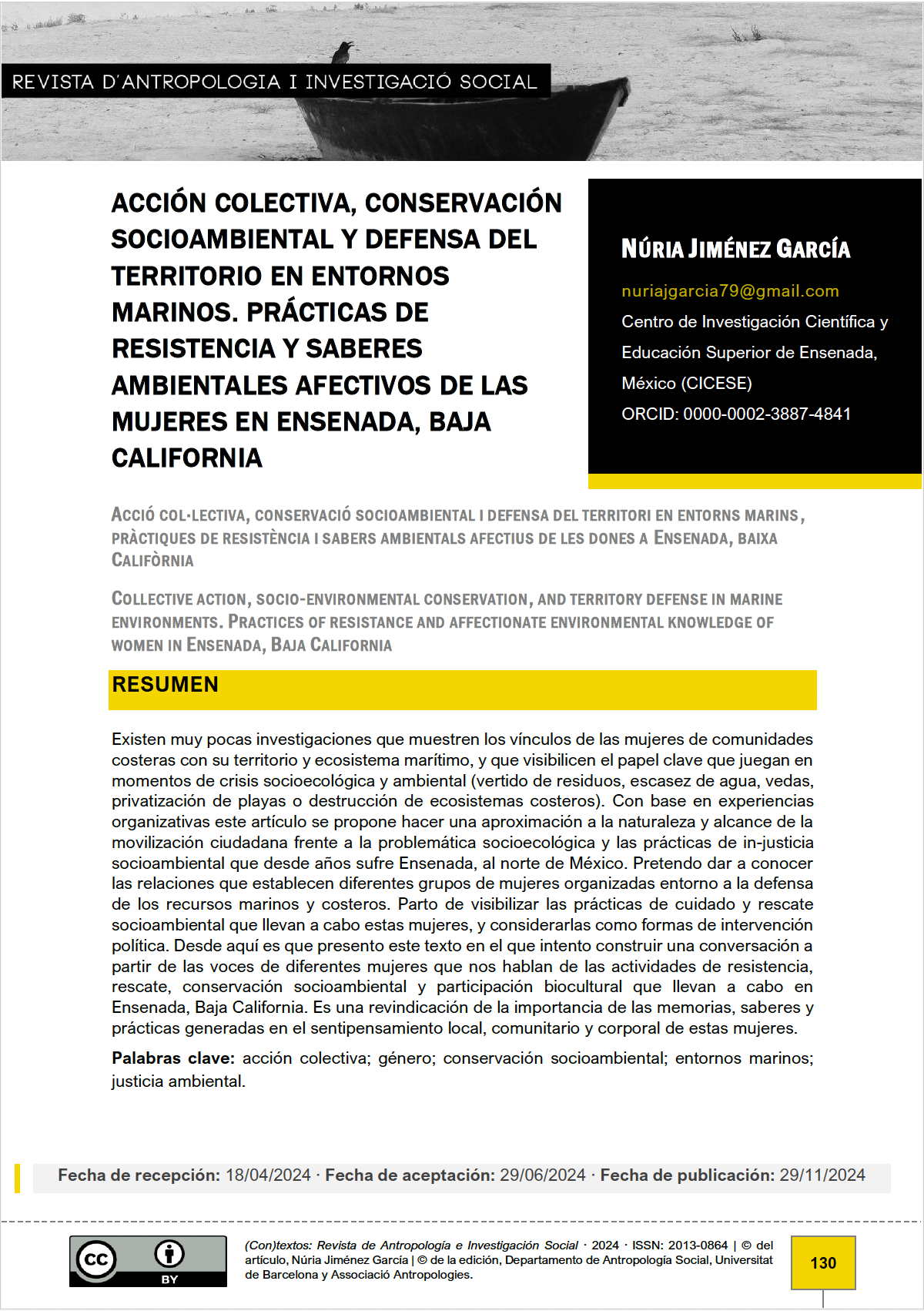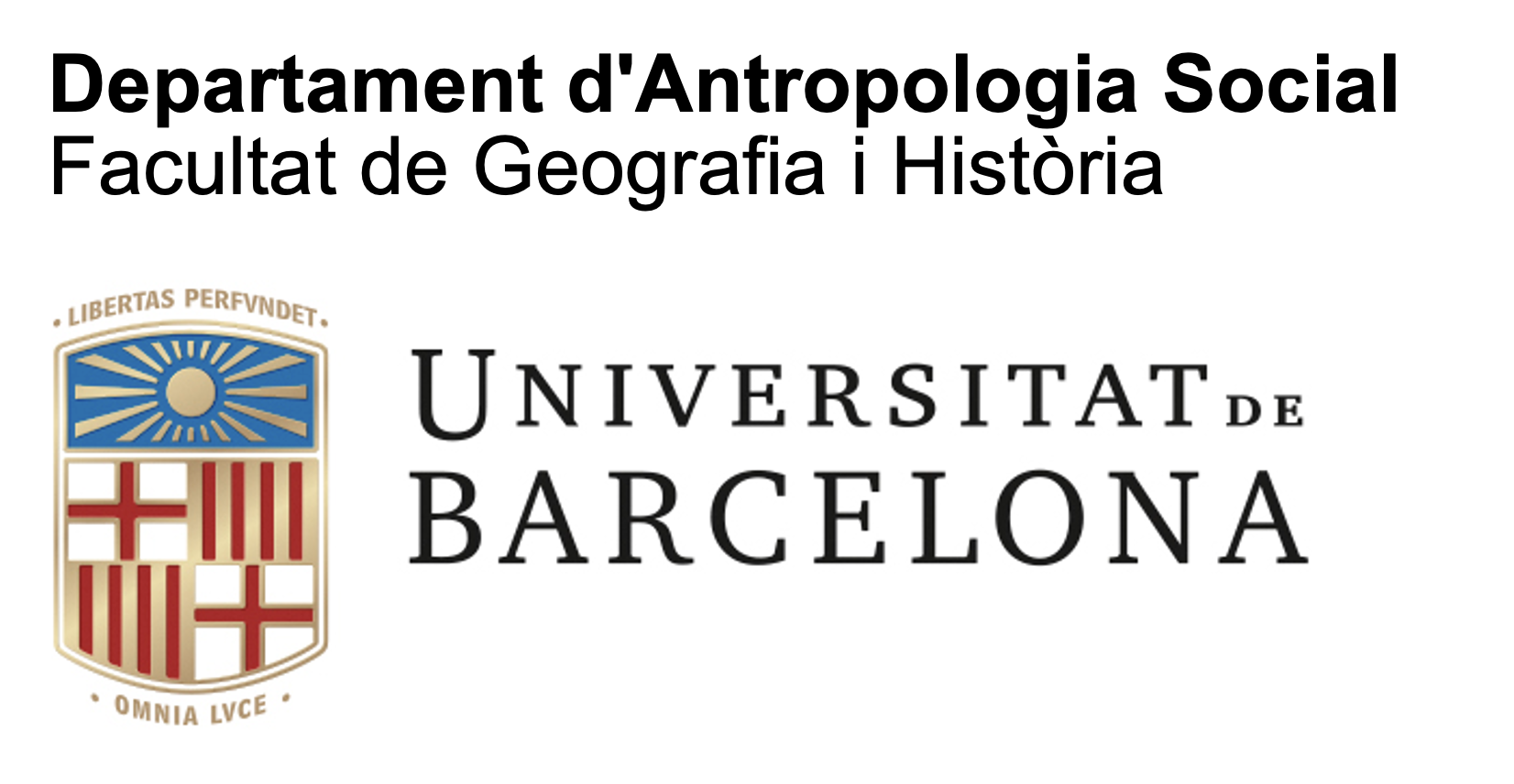Collective action, socio-environmental conservation, and territory defense in marine environments. practices of resistance and affectionate environmental knowledge of women in Ensenada, Baja California
DOI:
https://doi.org/10.1344/contxt.2024.13.130-156Keywords:
Collective action, gender, socio-environmental conservation, marine environments, environmental justiceAbstract
There are very few research studies that show the links of women from coastal communities with their territory and marine ecosystem, and that make visible the key role they play in times of socioecological and environmental crisis (waste dumping, water scarcity, fishing bans, privatization of beaches, or destruction of coastal ecosystems). Based on organizational experiences, this article aims to approach the nature and scope of citizen mobilization in the face of socioecological problems and the practices of socioenvironmental injustice that Ensenada, in northern Mexico, has been suffering from for years. I aim to show the relationships established by different groups of women organized around the defense of marine and coastal resources. I start by highlighting the practices of care and socioenvironmental rescue carried out by these women and considering them as forms of political intervention. It is from here that I present this text in which I attempt to build a conversation from the voices of different women who speak to us about the activities of resistance, rescue, socioenvironmental conservation, and biocultural participation carried out in Ensenada, Baja California. It is a vindication of the importance of the memories, knowledge, and practices generated in the local, community, and bodily sentipensamiento of these women.
Downloads
References
Appleton, Felicity y Brian Smout. 2003. The gender and water development report 2003: gender perspectives on policies in the water sector. Loughborough University
Arriagada, Evelyn y Antonia Zambra. 2019. “Apuntes iniciales para la construcción de una Ecología Política Feminista de y desde Latinoamérica”. Polis. Revista Latinoamericana (54): 12-26. http://dx.doi.org/10.32735/s0718-6568/2019-n54-1399
Basabe, Joatam. 2023. “Colapsan plantas de tratamiento”. Períodico El Vigía, el 4 de abril. https://www.elvigia.net/general/2023/3/4/colapsan-plantas-de-tratamiento-412838.html
Butter Maureen. 2006. “Are Women More Vulnerable to Environmental Pollution?” Journal of Human Ecology 20 (3): 221-226. DOI: 10.1080/09709274.2006.11905931
CabnalL, Lorena. 2010. Feminismos diversos: el feminismo comunitario. ACSUR-Las Segovias
Cobián, Orlando. 2023. “Acceso a Playa Stacks no está abierto, pese a declaración hecha por el alcalde”. Períodico El Vigía, el 12 de agosto. https://www.elvigia.net/general/2023/8/12/acceso-playa-stacks-no-esta-abierto-pese-declaracion-hecha-por-el-alcalde-423728.html
Despret, Vinciane. 2022. Habitar como un pájaro. Modos de hacer y pensar los territorios. Buenos Aires: Cactus.
Diario Oficial de la Nación.1991. Procuraduria Federal de Proteccion al Ambiente. México https://www.profepa.gob.mx/innovaportal/file/3668/1/reglamento__zofemat.pdf
Fals Borda, Orlando. 2009. Una sociología sentipensante para América Latina. Bogotá: Siglo del Hombre Editores.
Fernández Bouzo, Soledad. (2020). Imaginaciones socio-ecológicas. Apuntes para ensayar mundos con justicia ecosocial. Revista Florestanía. https://florestania.ar/2020/06/05/imaginaciones-socioecologicas-apuntes-para-ensayar-mundos-con-justicia-ecosocial/
García, Jayme. 2023. “Se han sancionado a las empresas de El Sauzal que no cumplen”. Períodico El Imparcial, 20 de octubre. https://www.elimparcial.com/tijuana/ensenada/Se-han-sancionado-a-las-empresas-de-El-Sauzal-que-no-cumplen-20231020-0021.html
Gutiérrez, María L. 2022. “Mujeres por el mar”. Periódico El Vigía, 17 de septiembre. https://www.elvigia.net/columnas/2022/9/17/mujeres-por-el-mar-400920.html
Harris, Leila. (2022). “Towards enriched narrative political ecologies”. Environment and Planning E: Nature and space 5(2): 835-860. https://doi.org/10.1177/25148486211010677
Jiménez, Nuria. 2023 “Sentipensar el género en los estudios marítimos y pesqueros”. Nexos. https://medioambiente.nexos.com.mx/sentipensar-el-genero-en-los-estudios-maritimos-y-pesqueros/
______. 2019. “’Yo no me voy a casar, digo, yo quiero divertirme’. Resistir siendo mujeres solas”. L’Ordinaire des Amériques 224. https://doi.org/10.4000/orda.4756
______. 2015. “Solidaridades femeninas y espacios comunitarios: prácticas femeninas en la Costa Chica de Oaxaca”. Iluminuras 16(40):184-217
Larrea-Killinger, Cristina, Araceli Muñoz, Jaume Mascaró. 2017. “Cuerpos tóxicos: la percepción del riesgo de la contaminación interna por compuestos químicos en España”. Salud Colectiva. 13(2):225-237. doi:10.18294/sc.2016.1161
Maffi, Luisa 2001. Biocultural Diversity.Linking Language, Knowledge, and the Environment. Washington, D.C: Smithsonian Institution Press, https://www.sil.org/system/files/reapdata/10/87/34/108734828518823365457562969695287058993/SILEBR_2004_007.pdf
ONU-Habitat. 2020. “Componentes del Derecho a la Ciudad”, 24 de febrero. https://onu-habitat.org/index.php/componentes-del-derecho-a-la-ciudad#:~:text=El%20Derecho%20a%20la%20Ciudad,comunes%20para%20una%20vida%20digna.
Paredes, Julieta. (2008). Hilando fino desde el feminismo comunitario. https://mujeresdelmundobabel.org/files/2013/11/Julieta-Paredes-Hilando-Fino-desde-el-Fem-Comunitario.pdf
Rocheleau, Dianne, Barbara Thomas-Slayter y Esther Wangari. 1996. Feminist political ecology: Global issues and local experience. Routledge
______. 2004. “Género y ambiente: una perspectiva de la ecología política feminista”. En Verónica. Vázquez García y Margarita. Velázquez Gutiérrez, (Eds.), Miradas al futuro. Hacia la construcción de sociedades sustentables con equidad de género. México: CRIM-PUEG. https://biblio.flacsoandes.edu.ec/libros/17679-opac
Suarez, Elena. 2021. “Conspiracionistas Ensenada”. Desde lo Local (podcast), entrevista por Yajaira Villaseñor, 17 de diciembre. https://radio.uabc.mx/podcast/conspiracionistas-ensenada
Sultana, Farhana. 2011. “Suffering for water, suffering from water: emotional geographies of resource, access, control and conflicto”. Geoforum (42): 163 - 172. https://doi.org/10.1016/j.geoforum.2010.12.002
Svampa, Maristella. 2015. “Feminismos del Sur y Ecofeminismo”. Revista Nueva Sociedad 256: 127-131
United Nations Development Programme. Chemicals and Gender. Gender Mainstreaming Guidance Series. 2011. Montreal: UNDP. https://www.undp.org/sites/g/files/zskgke326/files/publications/2011%20Chemical&Gender.pdf
World Health Organization. 2010. “Social and gender inequalities in environment and health”. Fifth Ministerial Conference on Environment and Health, 10–12 marzo.

Downloads
Published
How to Cite
Issue
Section
License
Copyright (c) 2024 Nuria Jiménez García

This work is licensed under a Creative Commons Attribution 4.0 International License.
The authors who publish in this journal agree to the following terms:
The author retains the authorship rights, and grants (Con)textos: revista d'antropologia i investigació social the rights to the first publication of the article.
The author authorizes the reproduction and dissemination of their articles in indexing and abstract services, academic databases and repositories in which the journal currently or in the future participates. After No 13, texts will be disseminated with the Creative Commons - Attribution (CC-by) license as long as the author and the journal are acknowledged.
Likewise, the authors can deposit the final version accepted for publication in institutional or thematic open access repositories. (Con)textos: revista d'antropologia i investigació social does not accept any responsibility for the views and statements made by the authors in their works.






